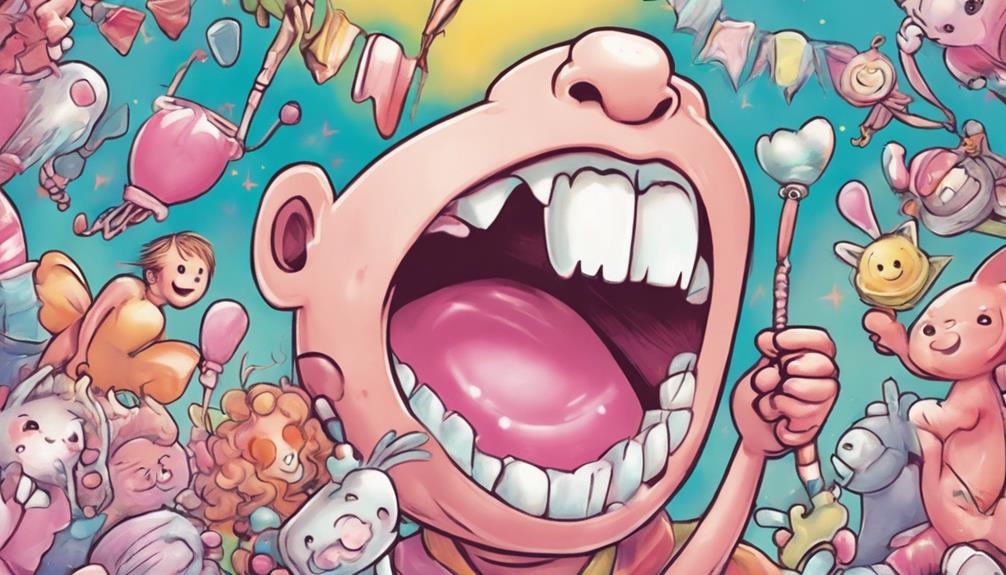Yes, kidney disease can affect your teeth. It weakens your immune system, increasing the risk of infections like gum disease. Dry mouth, a common issue for those on dialysis, also reduces saliva production, making you more susceptible to tooth decay and cavities. Additionally, there's a link between gum infections and kidney function decline. Regular dental check-ups are essential for catching problems early and preventing complications. Maintaining good oral hygiene is especially important for your overall health. There's much more to explore about how kidney health interacts with dental care, so keep going to learn about it. One of the effects of kidney disease on oral health is the potential for mineral and bone disorders, which can lead to weakened jawbones and tooth loss. It’s important to communicate with your dentist about your kidney health so they can tailor a treatment plan specific to your needs. Understanding and addressing the effects of kidney disease on oral health can help you maintain a healthy and functioning smile.
Key Takeaways
- Kidney disease can weaken the immune system, increasing the risk of gum disease and infections.
- Dry mouth due to dialysis and medications can lead to higher susceptibility to cavities and tooth decay.
- There is a direct correlation between gum infections and declining kidney function, with a 10% increase in infections linked to a 3% decline in function.
- Periodontal disease may cause systemic inflammation, further complicating kidney health and function.
Impact of Kidney Disease on Teeth

Kidney disease considerably impacts your dental health, increasing the risk of tooth decay and gum disease due to its effects on your immune system. When you have kidney disease, your immune system weakens, making it harder to fight off infections, including those affecting your gums. This can lead to periodontal disease, a serious form of gum disease that can cause significant oral health issues.
Patients often experience dry mouth, a common side effect of dialysis and medication, which exacerbates tooth decay since saliva is essential for neutralizing acids and washing away food particles. With reduced saliva, your teeth become more susceptible to cavities and other dental problems. In addition, studies show that a 10% increase in gum infection can correlate with a 3% decline in kidney function, emphasizing the link between oral health and kidney health.
To minimize these risks, regular dental care is important. Early detection of oral health issues can prevent complications that may worsen your kidney condition. Maintaining good dental hygiene and attending routine check-ups can help you protect your teeth and gums while managing kidney disease effectively.
Oral Health Risks for Kidney Patients

Oral health risks increase considerably for patients with kidney disease, as their weakened immune systems make them more vulnerable to infections and complications like gum disease and tooth decay.
When you have kidney disease, your body struggles to fight off infections, which can lead to more severe oral health issues. You might also experience dry mouth, a common side effect that reduces saliva production. This dryness elevates your risk for cavities and gum disease since saliva plays an essential role in maintaining oral health.
Research shows a direct correlation between gum infections and kidney function; a 10% increase in gum disease can result in a 3% decline in kidney health. This interconnectedness highlights the significance of maintaining good oral hygiene.
Periodontal disease can cause systemic inflammation, further complicating your kidney condition. As a result, regular dental check-ups are vital for you. Early detection and treatment of oral health issues can prevent serious complications related to kidney disease.
Make it a priority to discuss any dental procedures with your healthcare provider to guarantee your overall health remains stable while managing your kidney health.
Dental Care Considerations for Dialysis

For dialysis patients, maintaining good dental care is vital to support nutrition and overall health.
Healthy teeth allow you to consume high-quality protein foods necessary for your well-being.
Here are some important dental care considerations:
- Schedule appointments on non-dialysis days: This minimizes the risk of complications related to bleeding, especially since blood thinners are often prescribed during treatment.
- Prioritize regular dental check-ups: These visits help prevent serious infections that can escalate quickly in individuals with compromised immune systems due to kidney disease.
- Address oral health issues promptly: Conditions like cavities and gum disease can complicate kidney function, making proactive dental care significant.
- Communicate with your healthcare providers: This guarantees that your dental treatment plan considers the unique challenges faced by dialysis patients, especially regarding dental procedures.
Importance of Regular Dental Check-ups

Maintaining regular dental check-ups helps catch potential health issues early, ensuring you stay on top of your overall well-being. For kidney patients, these check-ups are essential, as they can help detect oral health issues like periodontal disease, which is more prevalent in those with chronic kidney disease. By scheduling biannual visits, you greatly reduce the risk of serious infections that could aggravate your kidney condition.
Dental care plans tailored to your specific needs are important. When you communicate openly with dental professionals about your kidney status, they can take appropriate precautions during treatments, improving your overall health outcomes. Regular dental appointments also provide an opportunity for dental professionals to monitor changes in your oral health and adjust your care plan as necessary.
Don't underestimate the significance of these visits. Keeping up with your dental check-ups not only protects your teeth and gums but also plays a key role in managing your kidney health. By being proactive and staying engaged with your dental care, you can help prevent complications that might arise from untreated infections or other oral health issues.
Connection Between Oral Health and Kidney Function

There's a significant link between your oral health and kidney function, with issues in one often affecting the other. If you have chronic kidney disease (CKD), you might face increased dental problems due to the interplay between your immune system and oral hygiene.
Here are some key connections to reflect on:
- Gum Disease: CKD patients are more prone to gum disease, which can worsen kidney function.
- Cavities: The dry mouth often associated with CKD increases the risk of cavities.
- Periodontal Disease: Bacteria from periodontal disease can enter your bloodstream, leading to systemic infections that may further compromise kidney health.
- Infections: With a weakened immune system, CKD patients are more susceptible to oral infections that can exacerbate dental issues.
Maintaining good dental care and oral hygiene is essential for managing chronic kidney disease. Regular check-ups can help you catch and address potential problems early on, ensuring your oral health supports your overall kidney function.
Frequently Asked Questions
What Are the Symptoms of Worsening Kidney Disease?
As kidney disease worsens, you might experience persistent fatigue, swelling in your legs, changes in urination, a metallic taste, bad breath, and skin rashes. These symptoms indicate your kidneys are struggling to function properly.
What Are the Symptoms of Kidney Disease in the Mouth?
Imagine you're experiencing persistent bad breath and painful mouth ulcers; these symptoms might indicate kidney disease. You could also suffer from dry mouth, increasing your risk for cavities and gum disease. Oral health's vital!
What Is the Most Common Oral Manifestations of Kidney Disease?
The most common oral manifestations of kidney disease include gum disease, dry mouth, and oral infections. You might notice foul odors, red ulcers, or other lesions, all signaling the systemic effects of kidney dysfunction.
What Is the Best Thing to Drink for Your Kidneys?
To support your kidneys, drink plenty of water, herbal teas, and coconut water. These choices keep you hydrated and help flush out toxins, while limiting sugary drinks will protect your overall kidney health.
How Does Kidney Disease Impact Dental Health?
Kidney disease can significantly impact teeth health. Patients with kidney disease have a higher risk of developing periodontal disease, cavities, and dry mouth. These oral issues can be exacerbated by the medication and treatments for kidney disease. Proper dental care is crucial for maintaining oral health in those with kidney disease and teeth health.
Conclusion
To sum up, neglecting your dental health can lead to a vicious cycle that worsens kidney disease.
Your mouth isn't just a gateway to your body; it's a reflection of your overall health.
By prioritizing dental care and keeping up with regular check-ups, you not only protect your teeth but also support your kidneys.
Remember, a healthy smile can be your first line of defense in maintaining kidney function—so don't wait; take charge of your oral health today!









